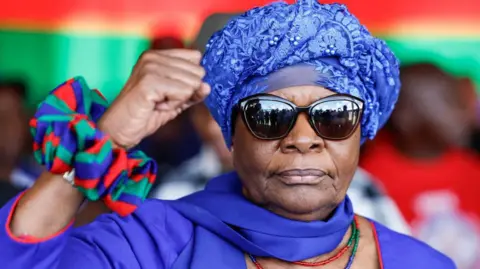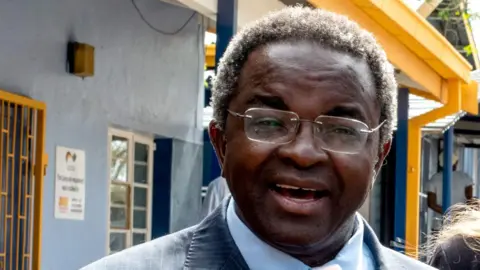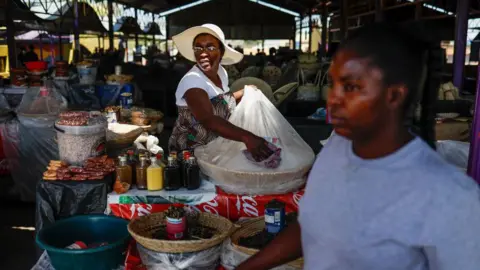 AFP
AFPIf things work out as Namibia’s long-time governing party hopes, the country will be electing its first female head of state this week.
But a mood of disillusionment with liberation movements in southern Africa, coupled with the anti-incumbency feeling in many parts of the world, may pose a threat to what would be an historic achievement.
Vice-President Netumbo Nandi-Ndaitwah, 72, is the flag-bearer for Swapo, which has led the country since independence from apartheid South Africa in 1990.
Tanzania’s Samia Suluhu Hassan is currently Africa’s only female president, so Nandi-Ndaitwah would be joining an exclusive club if she is victorious.
Her party, totally dominant for three decades, saw a large drop in its support in the last general election. It goes into Wednesday’s vote amid an unemployment rate of 19% – almost the same as it was 30 years ago – troubled government finances, questions about corruption and high levels of inequality.
Standing in Nandi-Ndaitwah’s way is her main challenger among the 14 other candidates – Panduleni Itula of the Independent Patriots for Change (IPC) party.
She is also up against a traditional and male-dominated political culture in the country.
But she is a trusted leader of this sparsely populated and peaceful country having served in high government office for a quarter of a century.
“I have always believed in teamwork, that is what made me achieve what I have achieved,” she has said.
Known for her hands-on and pragmatic style of leadership, the vice-president is also fiercely loyal to the party, which she joined as a teenager.
At 14 she became part of the movement resisting rule from South Africa, which had governed the country – then known as South West Africa – since the end of World War One and later introduced the racist system of apartheid.
 AFP
AFPShe was recognised for her tenacity and organisational talent as leader of Swapo’s Youth League, which became a stepping stone to her political career, which has included ministerial roles in foreign affairs, tourism, child welfare and information.
She has garnered a wealth of knowledge and experience that could stand her in good stead should she get into the driving seat.
“She seems so wise and sweet and kind, even in the way she tries to say everything in such a way that even like me will understand,” Laimi, a potential voter, told the BBC in the capital, Windhoek.
“Itula is like a new piece of jewellery with his glasses, his smart suit and his confident walk, but maybe he blinds you with his shine,” said her friend Maria.
Both are young adults who have been unable to find jobs.
A trained dentist, Itula, 67, was himself once a Swapo stalwart but was expelled from the party in 2020 after runnig as an independent candidate against President Hage Geingob in the 2019 poll.
He had also been a youth leader and spent some time in prison before going into exile in the UK in the early 1980s. He returned to Namibia in 2013.
Six years later, he charismatically came crashing into the front row of Namibian politics, challenging Geingob in the presidential election after saying the Swapo process for choosing its candidate was flawed.
Itula’s intervention in that election led to Swapo getting its lowest ever share – 56% – in the presidential election and also losing its two-thirds majority in parliament.
As someone who had a professional life outside politics, he has an appeal to the 50% of the 1.5 million voters who are under the age of 35, many of whom want economic change, a job or a measurable boost to their incomes.
His bold and at times brash style, rejecting the more staid political rhetoric of Nandi-Ndaitwah, has seen him win support among business people and the growing urban intelligentsia.
But while Itula is quick off the mark and eloquent, the vice-president chooses her words wisely, and speaks slowly and deliberately.
 AFP
AFPNandi-Ndaitwah seeks harmony and teamwork, emphasising community, passion and care, and as such, reaches right down to the grass roots.
And as the first woman with a chance of becoming the country’s president, she carries the hope of some women who want a change from the patriarchal society.
However, Nandi-Ndaitwah represents the “tried and trusted” old school of Namibia’s liberation struggle, while Itula represents the possible “wind of change” in a political landscape needing a facelift.
According to political analyst Henning Melber, the close rivalry between the two leading candidates could mean that the presidential election will go into an unprecedented second round run-off, which is required if no-one gets more than half of the votes cast.
In neighbouring South Africa, the African National Congress, in power since 1994, was forced into a coalition following May’s general election. While in Botswana – just to the east – the Botswana Democratic Party, dominant for nearly six decades, crashed to a humiliating defeat at the end of last month.
Swapo wants to avoid the same fate.
The winner on Wednesday will be the candidate who can be most trusted on issues such as youth unemployment, corruption, health care, education and infrastructure improvement, while also being able to bolster the economy.
This will need to happen without having to sell off the country’s vast natural resources to foreign bidders – such as off-shore gas as well as lithium and other essential metals.
Itula’s IPC was not part of the elections in 2019, but has performed strongly in local elections since then and has the appearance of a credible political alternative. It has won praise for the way it has run some local governments.
Nandi-Ndaitwah’s biggest asset may be that she is, as Namibian diplomat Tuliameni Kalomoh once stated, seen as “incorruptible, both morally and materially”.
You may also be interested in:
 Getty Images/BBC
Getty Images/BBCfrom World News – Techyrack Hub https://ift.tt/mV8z9qT
via IFTTT
